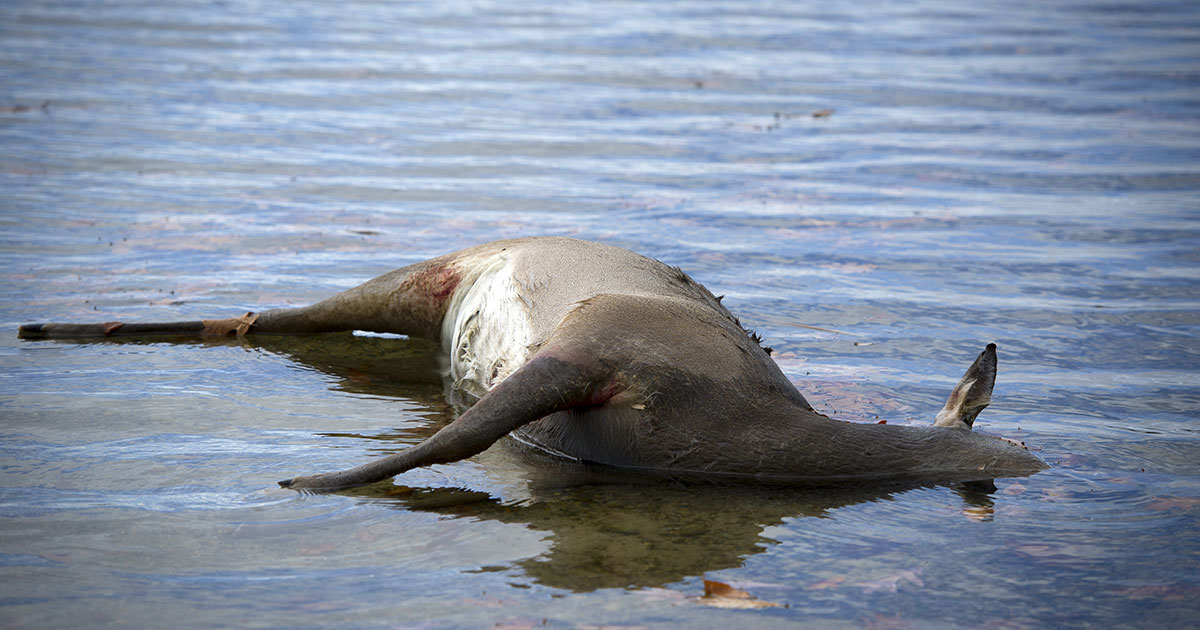- Details
MDNR Report
Throughout Michigan, hunters are preparing stands, blinds and camps for the upcoming firearm deer season, which begins Friday, Nov. 15. Although there's understandable excitement ahead of the opener, the Michigan Department of Natural Resources reminds everyone to respect the state's five-day quiet period, Nov. 10-14.
During these five days, unless hunting for small game, waterfowl or fur harvesting, it is unlawful to transport or possess a rifle or shotgun with buckshot, slug load, ball load or cut shell in an area frequented by deer. Unloaded firearms securely encased or carried in the trunk of a vehicle may be transported to or from a hunting camp.
“Hunters know that they are on the cusp of another Michigan firearm deer season once we enter into the five-day quiet period,” said Capt. Pete Wright, DNR Law Enforcement Division. “Those critical days create a window of time, just before the opener, when hunters can catch their breath and the woods have a chance to calm.
"This period is like pushing a reset button, allowing deer to settle back into their day-to-day patterns, which in turn increases the chances of a successful hunt.”
Small game or waterfowl hunters and fur harvesters can still carry the appropriate firearm for the season. Small game and waterfowl hunters may carry shotguns with shotshells for hunting small game, but cannot possess buckshot, slugs, ball loads or cut shells during this time. Fur harvesters may carry rimfire firearms (.22-caliber or smaller) while actively hunting or checking traplines during the open furbearing animal season.
Refer to the 2024 Deer Hunting Regulations Summary for more information.
Contact the Report All Poaching hotline at 800-292-7800 to report trespassing, shooting or other related natural resource violations.
- Details
IDNR Report Applications open on Monday, Oct. 7 for hunters to participate in Indiana State Park deer management draw hunts. These hunts follow science-based wildlife management to maintain healthy deer populations in the regions where the hunts are hosted. Participating properties include the following state parks: Brown County, Chain O’Lakes, Charlestown, Clifty Falls (archery only), Fort Harrison (archery only), Harmonie, Lincoln, McCormick’s Creek, O’Bannon Woods, Ouabache, Pokagon, Potato Creek, Prophetstown, Shades, Shakamak, Spring Mill, Summit Lake, Tippecanoe River (archery only), Turkey Run, Versailles, and Whitewater Memorial, as well as Cave River Valley Natural Area, Raccoon State Recreation Area (SRA), and Trine SRA. “Across Indiana’s public lands, we work throughout the year to assess and properly manage our wildlife populations, designed around promoting healthy ecosystems,” said Anthony Sipes, natural resources manager for Indiana State Parks. “We invite hunters to apply to help us with this vital mission at our state parks.” Hunters can apply starting at 12:01 a.m. ET at on.IN.gov/reservedhunt, which is the only way to apply and is the one-stop shop for all pertinent information. Hunters will be selected through a random computerized drawing. A link to view drawing results will be posted at the website listed above after the results are complete. Firearm hunts include any firearm legal to take deer on public land in Indiana. Archery hunts include any archery equipment legal to take deer in Indiana, including crossbows. Early hunts are Nov. 18-19, and late hunts are Dec. 2-3. Applicants must possess any valid license to take a deer in Indiana at the time of the application. By the date of the first hunt, applicants must be Indiana residents or possess a valid lifetime license to take deer in Indiana and be 18 years of age. Once an application has been submitted, information cannot be changed. Applications must be completed by the application deadline, Oct. 27.
- Details
By Louie Stout It’s no secret that deer are dying throughout Michiana and it’s likely to continue until we get a frost. The northern Indiana/southern Michigan die-off is the result of epizootic hemorrhagic disease, or EHD. EHD primarily affects white-tailed deer. It is transmitted through the bite of an infected midge, or biting fly. Deer cannot transmit the disease directly to one another; the virus must pass through the insect. Outbreaks of EHD typically occur in late summer and early fall but cease with the first frost, which kills the midge population. Infected deer exhibit symptoms such as loss of appetite, reduced fear of humans, weakness, excessive salivation, rapid pulse, increased respiration and fever. They may also seek out water to cool their elevated body temperatures. In severe cases, the disease leads to unconsciousness and death. Wildlife biologists in both states are monitoring the EHD outbreak but acknowledge there isn’t much they can do.  Dead Deer from EHD
Dead Deer from EHD
- Details
IDNR Report
The Natural Resources Commission gave final adoption of amendments to rule proposals governing deer hunting and river otter trapping at its meeting on Sept. 17.
The proposed deer regulation changes are listed below. The changes will not take effect this year except for the change in the definition of deer license bundle, bonus county antlerless limits, deer reduction zones, and ability to use an infrared sensor to retrieve a dead deer under an interim rule approved by the Governor’s Office and DNR Director.
Public comments can be submitted to the Natural Resources Commission (NRC) at www.IN.gov/nrc/rules/rulemaking-docket by clicking on “Submit Comments Here” in the Rulemaking Docket for the Proposed Bobcat Amendments.
Comments can also be sent by regular mail to:
Natural Resources Commission – Division of Hearings
Indiana Government Center North
100 North Senate Avenue – Room N103
Indianapolis, IN 46204
The deadline for submitting public comments is Nov. 14. The initial public hearing is on Thursday, Nov. 14, at the Southeast – Purdue Agricultural Center at 4425 East 350 North, Butlerville, IN 47223, from 5-7 p.m. ET on Nov. 14. You can attend in person or online anytime during that timeframe. The public hearing will also be webcast live on the NRC’s rulemaking docket website at www.IN.gov/nrc/rules/rulemaking-docket during the time of the public hearing, and comments will also be able to be made live through the online webcast. Sign up for updates at https://on.IN.gov/dfw-rule-changes.
- Details
IDNR Report
The Indiana DNR is reducing the County Bonus Antlerless Quotas (CBAQ) in Wabash, Porter, and Allen counties from two bonus antlerless deer to one bonus antlerless deer for the coming deer hunting season. This change is a result of the impact of epizootic hemorrhagic disease (EHD) on the deer herd in northern Indiana this year.
Changes to the CBAQ will not affect the Deer Reduction Zones.
Humans are not at risk for contracting EHD.
EHD is a viral disease that commonly affects white-tailed deer and is transmitted by biting midges, also known as sand gnats or “no-see-ums.” Cases typically occur during late summer and early fall, and there is evidence that outbreaks can be more severe in years in which there is a wet spring followed by a hot, dry fall. EHD is often fatal to deer, but some can recover and develop immunity.
Deer infected with EHD may display unusual behaviors such as lethargy, excessive salivation, or disorientation. EHD also causes fever in deer, which can cause them to seek water. As a result, many deer that die from EHD are found in or near open water sources like ponds and rivers.
Anyone who finds a deer that is showing signs of EHD or dead in water is asked to report it at on.IN.gov/sickwildlife.
DNR monitors for EHD annually; however, severe outbreaks don’t occur every year. The severity of EHD in a single year depends on a variety of factors including climate, immunity, and other ecological factors.
The effects of the deer harvest and EHD will be evaluated after the deer hunting season, and additional changes will be made for the 2025 hunting season, if necessary. EHD detections can be continually monitored at on.IN.gov/EHD.
Not every deer in an affected area will contract EHD. One sign a deer has recovered from EHD is sloughing or breaking on their hooves. DNR asks that successful hunters use the Deer After Hunt Survey to report the condition of their deer’s hooves, including both normal hooves and hooves that show evidence of sloughing or damage.




